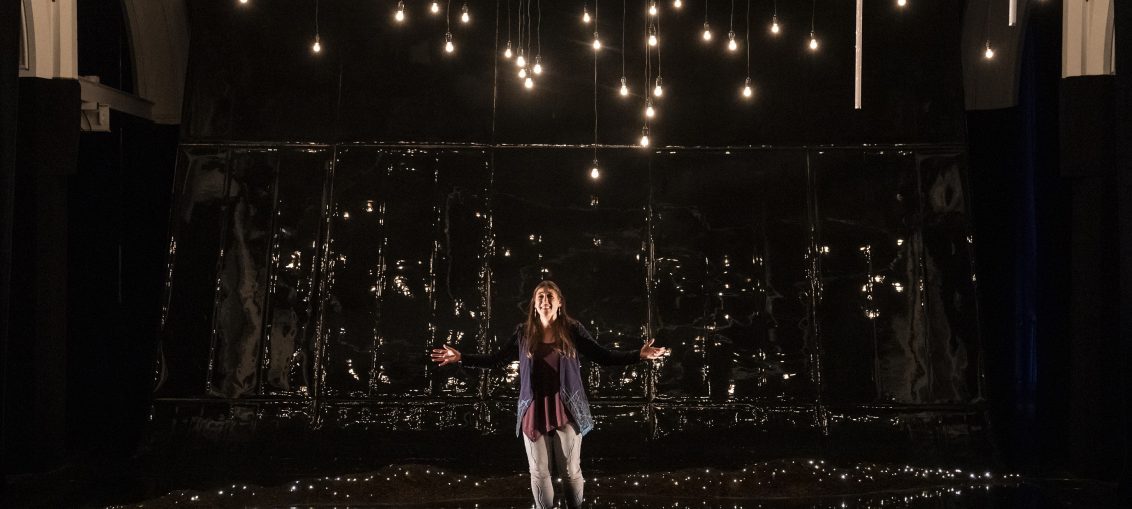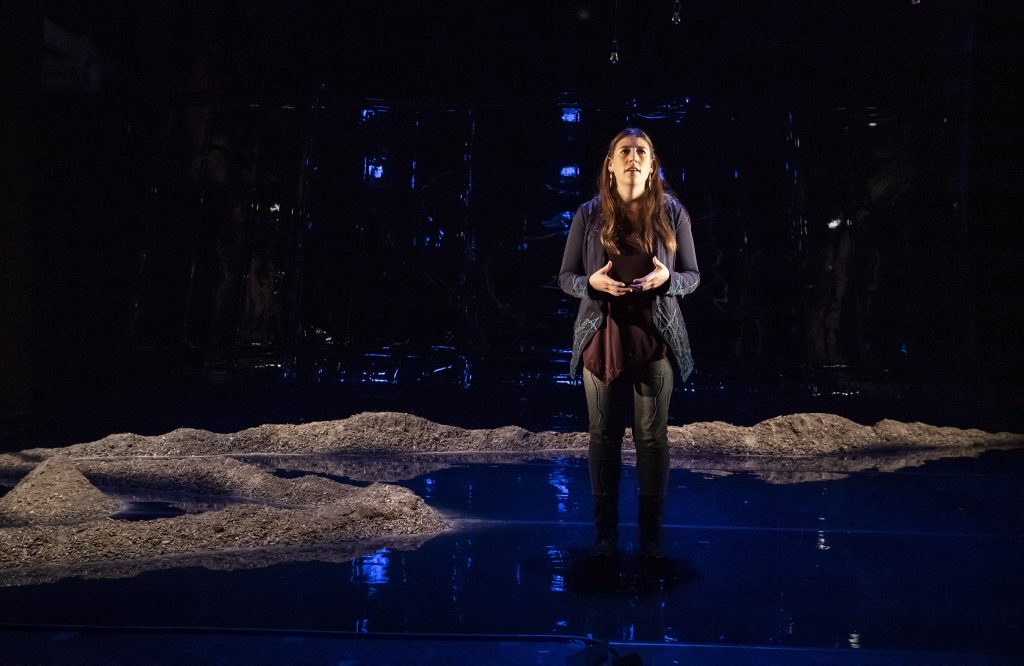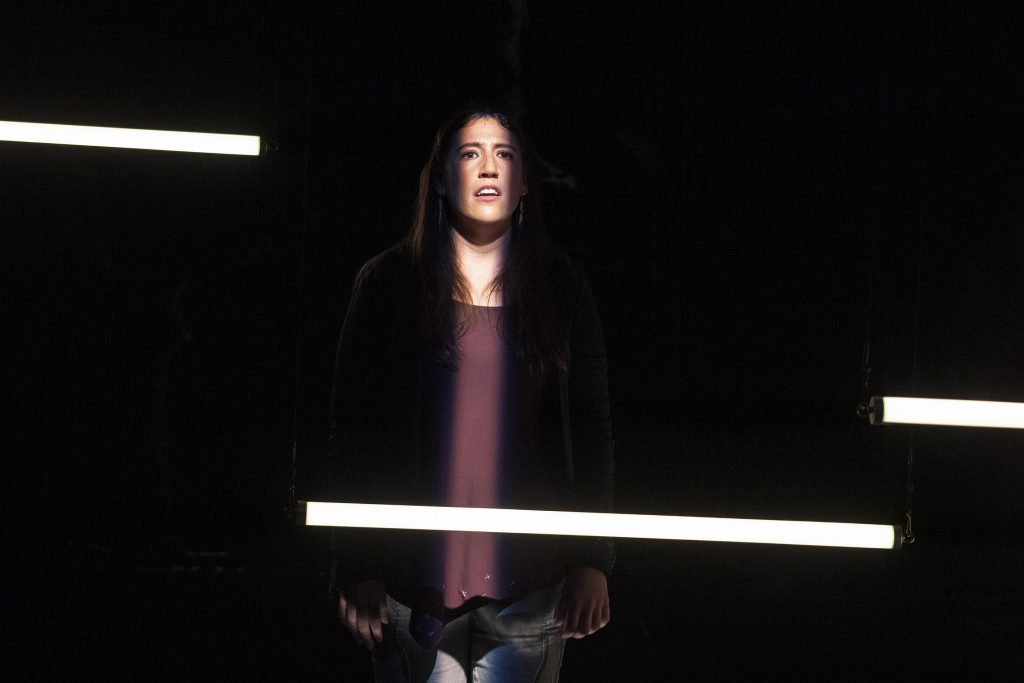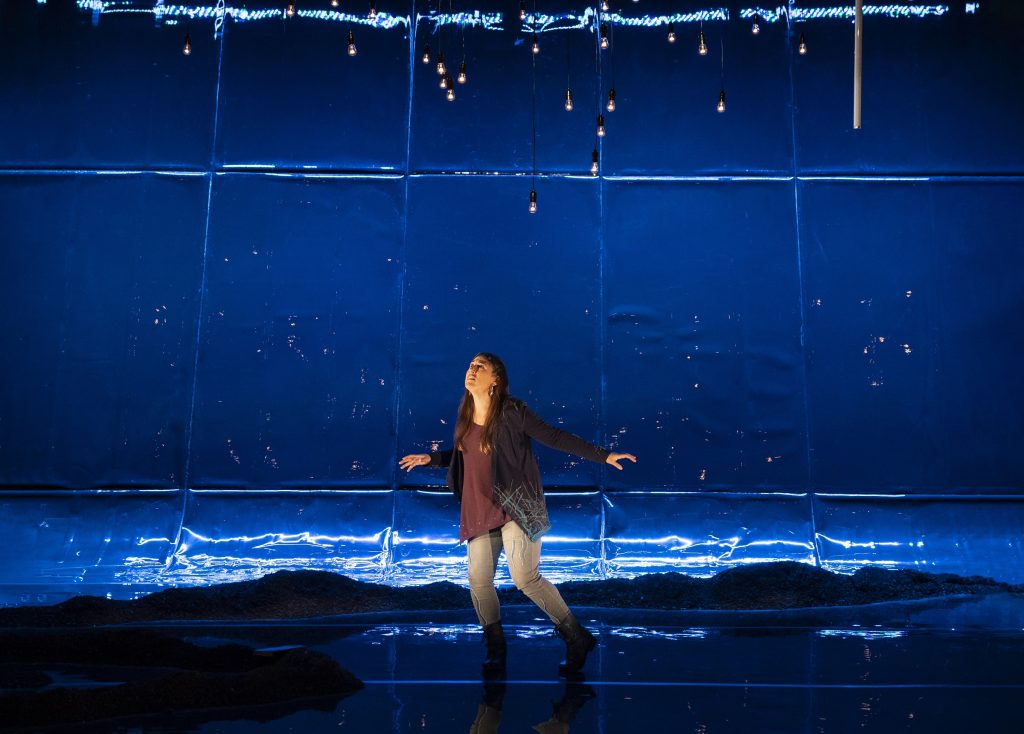
Theatre-maker Madeline Sayet straddles many identities that often contrast and sometimes conflict. She’s half Mohegan (on her mother’s side) and half Jewish (on her father’s side). Sayet is also an actress/director and an academic who found joy and solace in escaping through Shakespeare. But she can’t shake the painful scars of colonialism that haunts her people’s present and flavors their future, where erasure is imminent if the next generation doesn’t keep the Mohegan language and traditions alive. It’s a heavy burden for a young woman searching for her place in this world and a sense of belonging.
In her solo show, Where We Belong, thoughtfully directed by Mei Ann Teo, that dynamic offers plenty of dramatic exploration and deep dives into personal investigations of one’s destiny and life purpose. Do we get to choose what we want to do and where we belong, or do our heritage, circumstances, and fate decide that for us? If you are one of the last of the Mohegans (not to be confused with Mohicans, another Algonquian-speaking tribe) from upper Thames valley, Connecticut, a group that numbers around 2200, according to the Mohegan Tribal Council, these questions hold more weight.
“What’s in a name?” is a famous quote from Romeo and Juliet where one’s title can define their fate. The Mohegan people are named after a landbound creature, a wolf, but Sayet’s Mohegan name is Acokayis (blackbird or the dark one who flies apart). Her middle name is Fielding in honor of Fidelia Fielding/Flying Bird/JeetsBodernasha, the last fluent speaker of the Mohegan language whose journal is like a sacred text that keeps the language alive. So, despite her childhood fear of flying, Sayet seemed given no choice but to take to the sky. Where We Belong, she says, is the story of how she “became a bird.”
In 2015, Sayet left her heart with her indigenous side in Connecticut to pursue a Ph.D. in Shakespeare and colonialism in England, as the nation was rife with a sense of division during the Brexit vote. One of her main focuses was on the character Caliban from the Tempest, clearly an indigenous inhabitant of the island who is ridiculed by white colonizers who come to the island. Caliban’s (and the magical sprite Ariel’s) freedom only arrives when the invaders depart. She formed many intriguing theories around Shakespeare as a kind of anti-colonialist based on elements from his plays. Still, in the end, nothing could offer the feeling of escape or purpose she sought. The deeper she dug, the more bones of her ancestors she uncovered, literally and figuratively.

Sayet discovers an indigenous ancestor, Mahomet Weyonomon, who came to England as an activist and revolutionary in 1735, seeking justice from the Crown for the unfair treatment of his people. He died of smallpox, only slightly older than her before he could get that justice and is buried in the churchyard of Southwark Cathedral. She visits and speaks with him about her struggles, as one would take comfort in knowing a living relative was just a tube ride away. This ghost offers solace, but he haunts her, a reminder of what she could and should be doing for the Mohegan people instead of studying the Bard.
One of the most intriguing and disturbing scenes occurs at the British Museum. It’s a dialogue between Sayet and an academic, swiftly performed with a switch of accents. Here the macabre truth of many of these institutions is unveiled. The skeletons of North American indigenous people (also Maori, Africans and Asian Pacific islanders) are displayed like bronze or marble statues. This grisly sight shakes Sayet to the core. She works up the courage to ask how they got there and how many people does the museum possess? The academic says they were all “legally acquired” (meaning purchased) and that, not including some random skulls, they have about 12,000 human remains. “You have 12,000 people here? And you won’t let them go home?” The academic shrugs it off, explaining that if they started to give back the bones, who knows what else they’d have to return. This nightmare is a critical turning point in her path.

When Sayet questioned how history was being taught and told (something instilled by her mother from an early age to defend their people’s roots), her professors criticized her for being too emotional. They remarked that academics need to be “distanced and analytical.” But how can one detach themselves from the erasure and numerous injustices inflicted upon their people and ancestors? While she did not complete her P.h.D., she gained something far more meaningful; her sense of self, identity, purpose and belonging.
The production design by Hao Bai masterfully serves the story and makes Sayet’s words and worlds. The lighting is modular, creating a feeling of claustrophobia or spaciousness, depending on the scene. It shifts the setting from the harsh glare of an airport customs desk to the soft glow of twinkling stars. Erik Schilke’s composition and sound design vary from subtle to earth-shaking.
As excellent as the structure and design for Where We Belong are, it would be intriguing to see how Sayet and her cohorts might benefit from employing some of the ideas and suggestions from xwélméxw (Stó:lō) writer Dylan Robinson’s Hungry Listening. The book’s purpose is to consider listening from Indigenous and settler colonial perspectives, presenting case studies on Indigenous participation in performance. In his critical response, Robinson evaluates how decolonial practices of listening emerge from increasing awareness of our listening positionality. Native author Beth Piatote says, “Hungry Listening demonstrates what it means at the practical, ethical, and political levels to write relationally with other living beings, including music, sound, belongings, languages, lands, ancestors, and readers. In method and content, Hungry Listening challenges settler colonial sensory and political orders and a powerful affirmation of Indigenous thought, practice, and art.”
Solo shows can easily fall into the trappings of navel-gazing, and for the most part, Sayet avoids this through her warmth, humor and the sincerity of her investigative journey. However, clocking in at 80 minutes felt a bit long. One’s focus begins to waver toward the end, with meandering parts between especially dramatic moments that shock one to attention again. The piece could benefit from slight edits and tightening of the script to make its many strengths even more impactful.

Finally, Sayet reaches the crescendo of her exploration, questioning why she felt the need to explore plays over 400 years old written by an English white man who’d never encountered an indigenous person instead of telling the Mohegan people’s stories. This is when she hits the proverbial jackpot of her life’s work and purpose.
These are the stage plays I cannot wait to see Sayet, a compelling performer and insightful person, continue to create, develop and share with the world. Even better if they are, in part or entirely, written in the tribe’s language, honoring her ancestors, the current and next generation, and the woman whose name she bears. Because unlike creatures who are landbound, those who can fly have a bird’s eye view and, therefore, a vaster and more forward-looking perspective. Birds can also sing. To close Where We Belong, Sayet chants in Mohegan. She welcomes her ancestors’ spirits home to the land, the stage, and into her heart and ours.
WHERE WE BELONG began performances in The Public’s LuEsther Hall with a Joseph Papp Free Performance on Friday, October 28 and will run through Sunday, November 27, with an official press opening on Wednesday, November 9.
Public Theater Partner, Supporter, and full-price single tickets can be accessed by visiting publictheater.org, calling 212.967.7555, or in person at the Taub Box Office at The Public Theater at 425 Lafayette Street. The performance schedule is Tuesday through Saturday at 8:00 p.m. and Saturday and Sunday at 2:00p.m. (There will be no 8:00 p.m. performances on Wednesday, November 23 and Thursday, November 24.)
 Friday, July 18, 2025
Friday, July 18, 2025